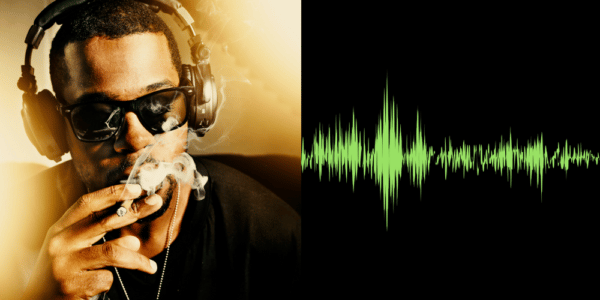5 minute read

The state of feeling high that cannabis gives changes how we perceive many things. Thus, you might notice that your favorite music sounds way better after you smoke your favorite Wedding Cake weed or Gelato weed. Scholars attribute this effect to the altered state of perceiving time when high. So, your brain may absorb the music esthetics differently, magnifying the weed’s impact on your pleasure neurons.
Here is a brief guide to the intimate relationship between music and weed. Let’s find out how cannabis and listening to music work together to enhance your sensual experience and maximize the pleasure of your pastime.
How Does Music Affect the Brain?
Music is a highly enjoyable and therapeutically valuable experience for the human brain. Listening to music is known to reduce anxiety, lower the blood pressure in your body, and soothe the pain. Besides, music sessions can improve the quality of your sleep, elevate your mood, stimulate memory, and enhance your overall mental alertness.
Thus, music is highly cherished for this complex of therapeutic benefits. It’s also known to train our brains in a non-intrusive yet effective way. Every musical piece has a unique composition and layering, so its perception follows structural, mathematical, and architectural principles. People unconsciously analyze the relationships between notes and follow the musical sequence, thus enjoying an active musical perception experience in an ethically rewarding way.
How Does Weed Affect the Brain?
The impact of weed on the brain is diverse and well-known. Weed includes the psychoactive compounds that bind to the receptors in your endocannabinoid system and affect your mood, appetite, and sensation.
Depending on your chosen strain, you may expect a euphoric, uplifted effect or an otherwise soothing, calming impact ideal for high-quality sleep. The concentration of CBD and THC cannabinoids in your chosen strain determines the effect.
- More THC in the weed you smoke ensures you’re energetic, uplifted, and happy.
- More CBD in your joint gives you a stress-relieving, relaxing effect.
However, the universal effect of weed is that of altered sensations. People who smoke weed often report that their visual and auditory experience intensifies and changes, giving them much additional enjoyment from weed consumption.
That’s why music works so well, as its regular esthetic impact on the human pleasure and reward receptors amplifies with the effect of weed on the same receptors. Based on these combined effects, you should enjoy music much more when high for the following reasons:
- Time goes slower than usual, allowing you to derive more enjoyment from music.
- The cannabis-related effect of intensified, altered perception allows you to hear the music more intensely, increasing this activity’s pleasure.
- As cannabis enhances the reward center in the brain, music and weed cause greater dopamine release.
- The feeling of euphoria and altered state of mind produced by weed can enhance the feeling of connectedness with your music idols.
Weed + Music: What Does Science Say?
Now that we’ve clarified that music and weed produce a range of effects on the human brain and can work in tandem, let’s deal with this relationship in more detail. What does the scholarly research say about this effect, and is there any clinical proof of the added effect of music on the THC-altered state of the user’s mind?
- Cannabis affects the human perception of timing processes at short-time scales of hundreds of milliseconds. Fachner discovered that cannabis produces an effect of altered temporality, which has had a long tradition of use among musicians and music fans since the early times of jazz. However, the mechanisms behind this altered temporality effect are still unknown.
- Freeman et al. found that cannabis could dampen the effects of music in brain regions sensitive to reward and emotion. However, cannabidiol was found to offset those effects.
- Fachner also conducted a topographic EEG study in 2002 to evaluate the impact of weed on alterations in music perception. The researcher found that THC increased the alpha percentage and power in the parietal cortex of the study participants. Weed caused hyperfocus on the musical time-space and changed the participants’ perception of musical acoustics. Thus, Fachner concluded that weed could indeed be used to help people with hearing impairments.
This evidence suggests that weed has a pronounced effect on people’s perception of music and even enhances their ability to discern tiny elements of musical works.
Don’t Smoke Weed in Silence
As you can see, music and weed indeed work very well together. On the one hand, listening to music when high can help you identify the musical elements you would otherwise have never noticed. On the other hand, you may get much more pleasure from the music session under the influence, as weed intensifies your reward and pleasure receptors’ sensitivity and makes music more enjoyable overall. So, don’t smoke in silence; turn on your favorite tracks to fully indulge in the weed consumption experience.





